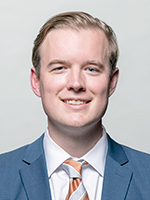Jack Boeglin
2021 Temple Bar Scholar Report
Reflection

My month in Legal London courtesy of the American Inns of Court’s Temple Bar scholarship was one of the most rewarding experiences of my legal career thus far. Not only did I have a truly enjoyable time on the program, but I also came away from the experience with a deepened appreciation of the UK legal system, both in how it shares qualities with, and differs from, the American model. Having previously spent eighteen months in the London office of the American law firm Covington & Burling, I came into the program with some familiarity of the work solicitors do in the UK. But due to the bifurcated nature of the UK system, I had little understanding of what it is barristers do, as well as how the various courts in the UK operate more generally. As I will return to below, one of the most interesting takeaways for me was just how outward facing the UK system is in contrast with the American one.
In the first week of our program, the scholars had the privilege to meet with an intimidating roster of legal officials in London, including a criminal judge at the Old Bailey and the Lord Chief Justice and Master of the Rolls of the Court of Appeal for England and Wales. When meeting with Justice Sara Cockerill, Head of the Commercial Courts, we were told that, in many cases before her, neither of the parties is British. Instead, jurisdiction arises from the parties’ choice of English Law, whether in a bill of lading or some other type of commercial agreement. As a result, English courts often act not as a forum to resolve domestic disputes, but instead as a trusted neutral arbiter for parties in third countries. To this American lawyer, trained in a federal system that casts a skeptical eye on claims without a strong domestic tie, the willingness—indeed, enthusiasm—of courts in the UK to hear such claims was fascinating.
In our second and third weeks, the scholars were assigned to shadow leading barristers in their day-to-day practices. What I had been told in the first week about English legal practice having an international bent was borne out in spades during my time in chambers at 4 Pump Court and 4 Stone Buildings. For instance, in my first week alone, I observed two proceedings with a distinctly international angle. First, I watched an ex parte hearing before Mrs Justice Cockerill herself, in which a non-UK shipper was seeking to compel arbitration in London against another non-UK shipper. Second, I sat in on a trial in the High Court, where factual witnesses were called from countries across Europe, including France, Spain, and Poland. In the United States, a trial with such an international flavor would be something of an exception. In the United Kingdom, one lawyer told me this case was also something of an exception—because the defendant was actually incorporated in the UK and not abroad!
In our final week, the scholars had the opportunity to learn directly from the Justices of the UK Supreme Court. This week, above all, brought home the differences between the UK and US models, particularly with respect to the proceedings we witnessed in the Privy Council. Housed within the Supreme Court building and composed of many of the justices that make up the Supreme Court, the Privy Council acts as the court of final resort for more than a dozen other countries and territories. Suffice to say, there is no court in the US with an international reach remotely comparable to that of the Privy Council.
While this reflection has focused primarily on the legal lessons I took away from the Temple Bar scholarship, I would be remiss not to mention what was perhaps the most remarkable feature of my time in London: the universal hospitality of the many UK lawyers and judges the scholars met with throughout our program. I am deeply grateful to our UK hosts for all of their efforts to enrich our experiences, as well as to the American Inns of Court for sponsoring this rewarding and eye-opening program.
Jack Boeglin is a law clerk to Associate Justice Sonia Sotomayor of the Supreme Court of the United States. Boeglin was initially a clerk for Associate Justice Ruth Bader Ginsburg; upon Ginsburg’s death, Sotomayor invited him to join her chambers. A 2016 graduate of Yale Law School, Boeglin has also clerked for Chief Judge Srikanth Srinivasan of the U.S. Court of Appeals for the D.C. Circuit and for Judge Guido Calabresi of the U.S. Court of Appeals for the Second Circuit. Before his work at the Supreme Court, Boeglin was an associate in the London office of the U.S. law firm Covington & Burlington LLP, where he helped U.S. technology companies navigate the European regulatory environment. His interest in comparative legal studies began even earlier, however. During law school, he traveled to Japan to study a mediation practice called “jidan” that lets criminal offenders apologize to victims and offer recompense.